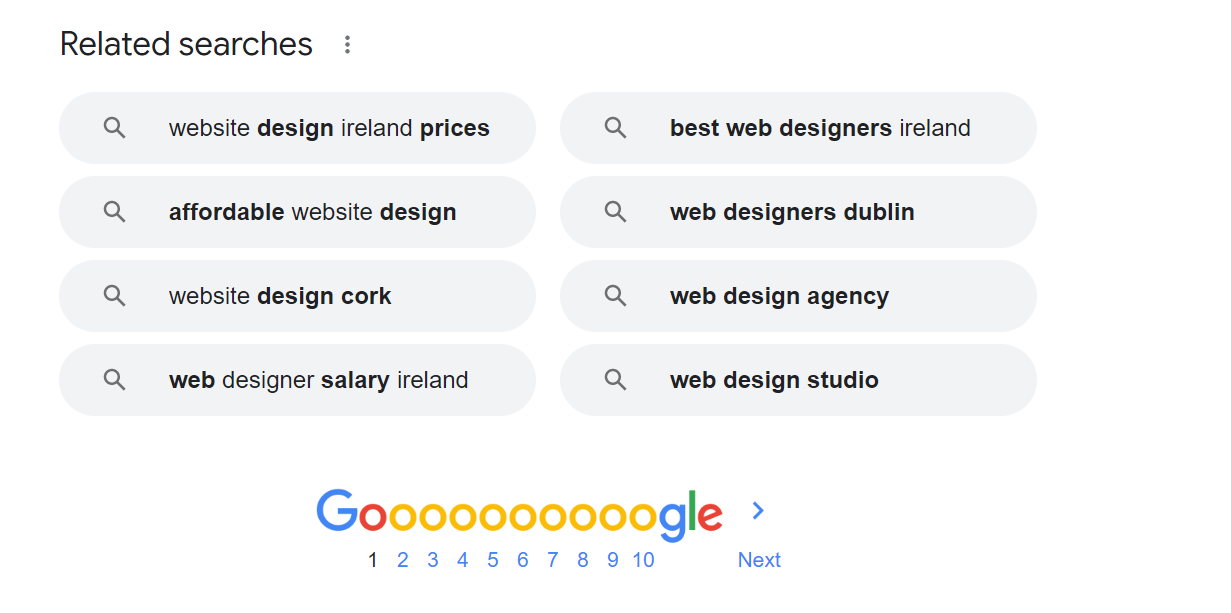How to Find Keywords for Your Website
If you own a website, I am sure you have heard of Search Engine Optimisation (SEO) which is the process of getting traffic from free, organic, editorial, or natural search results in search engines. Basically, it helps people find your website using Search Engines such as Google, Yahoo, Brave, etc. Part of optimising your website is using keywords. Keywords are the phrases and words individuals enter into search engines to find something they are looking for. It is important to use the right keywords so that you can rank higher on search engines and be found more easily by customers.
In this article, we are going to talk about how you can find the best keywords for your website to start driving more traffic to it.
How to conduct a search?
Your ultimate goal when using keywords is to find words that have a medium-high search volume and low competition volume. To do this you need to first start by writing two primary lists. One of these lists will be based on your business, the products/services you sell, your location, etc. The other list should be made up of a list of problems your audience has and what you think they will be typing into search engines to solve these problems. For example, if you run a women’s shoe shop, problems people might have is finding high heels that are comfortable or for wide feet, therefore, you would use the keywords “Comfortable High-Heels” and “Wide Foot High-Heels”.
We always recommend our clients to think of every customer they have ever had and what did that customer complain about leading them to buy your product? Use your customer’s problems as a way of getting in front of them!
Types of Keywords
There are two types of keywords that can be used on your site, “Head Terms” and “Long-tail Keywords”. Head Terms are more generic and short keywords (usually one to three words). Long-tail keywords are longer keyword phrases consisting of three or more words. For example, “Skincare” is a head term, and “Organic skincare products for the Face” is a long-tail keyword. It is imperative that you use both short and long keyword phrases throughout your website. As Long-tail keywords are a lot more specific and tailored, they tend to bring in more desirable customers than short keywords.
Related Search Terms
Have you ever searched for something on Google and it offers you related search terms at the bottom of the page? Use these to your advantage as these are other terms that your potential customers are using on Google to find your products. Take note of these and use them throughout your website.
Keyword Tools
There are many Keyword Search tools that you can use to help you find which of your keywords have high search volume and low competition volume. Ubersuggest is a good one that we have used before. They offer a free version which is great for anyone just looking to play around with it.
Another great tool we use often is Answer The Public. This online platform allows you to type in topics and it will produce the top searched terms related to this topic. It tells you exactly what people are typing into Search Engines when looking for your chosen topic. You can pull words and sentences from the results and use them across your site. The results given are also great to use as Blog Post titles!
Curated Keywords
Now that you know how to find keywords, let’s talk about how to curate these keywords to get the best results!
There are three main categories you have to consider when choosing your keywords.
Relevance: Search Engines such as Google, always aim to put the most relevant result in front of the person searching. Therefore, it is really important that the keywords you use are relevant to your business, the service you offer and relevant to what the customer is looking for. It is important that you strive to have the best resources on your site for a particular search query.
Volume: How many people are actually searching for the keywords you are using? Don’t input them if no one is searching for them! Using the tools mentioned above can help with this. Google offers their own keyword tool called Google Keyword Planner which can also be useful for finding words that have a high search volume.
Authority: Google likes to promote people who look like they know what they’re talking about and have the content, engagement and backlinks to prove it! Backlinks are basically links on other sites that link back to yours. What this says to Google or any other Search Engine is that people trust you enough to put a link to your site on theirs!
Competitors
We always say that your competitors are your biggest help in business and using them for keyword research is no different. You can use keyword search tools like Ubersuggest or SEMrush, to find out what keywords your competitors are using. This can help you find keywords that you hadn’t thought of yet or push you to improve your content related to certain search terms so that you rank higher than your competitor.
Conclusion
Although keywords play a vital role in Search Engine Optimisation, you must continue to publish high-quality content on your website, grow your authority by creating compelling content that people want to link back to, and by gaining high ratings from customers. We would always suggest having a “Google my Business” profile and encourage every customer you have to rate your business there. (Take some keywords from their reviews) SEO is something you have to work on continuously but over time this will lead to an increase in organic traffic to your site.
Need help optimising your website? Get in contact with us to help!

